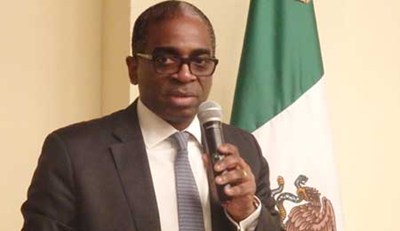FIRS: Making stamp duty the new black gold

This matter of making the Stamp Duty (and by implication tax revenue) the next black gold has occupied my mind even long before I was appointed the Executive Chairman of the Federal Inland Revenue Service. I have thought that given the way the Nigerian economy has been experiencing some difficulties due to unpredictable shocks in the competitive international oil market, it would be economically wise that the country begins to activate its latent tax potentials such as the stamp duty which has long been neglected. For me, the key to Nigeria’s economic prosperity is the tax revenue driven by Stamp Duties in the face of dwindling oil revenue.
Although, the Stamp Duty Act has been in place since 1939, not much attention is paid to it. Yet, if properly harnessed and administered it can be a goose that will lay the golden egg for the Federal Government. My optimism stems from the fact that Stamp Duty has the potential to yield tax revenue in the region of trillions of naira per annum. For instance, after we carried out an analysis of transactions in the banking sector, we discovered that in 2019 alone the total volume of transactions both chargeable and non-chargeable was over N52 billion of which the total value of transactions was over N613 trillion. If you compute N50 Stamp Duty on the chargeable transactions, of course, your guess is as good as mine. Presently, feelers from certain quarters have it that if the records of stamp duties on chargeable transactions from the year 2000 to present were to be scrutinised it would be discovered that trillions of unremitted stamp duty revenue are realisable.
Thus, I feel excited when recently the President and Commander-in-chief of the Armed Forces of the Federal Republic of Nigeria, Muhammadu Buhari inaugurated the Inter-ministerial Committee on the Audit and Recovery of Back Year Stamp Duties. This is an important step towards diversifying the Nigerian economy.
It is obvious that oil revenue has contributed greatly to the various infrastructural developments so far achieved in the country. These developments are noticeable in all sectors of the economy, and they are too many to be accounted for in this short piece. Yet, despite this seeming developmental leap, Nigeria has progressively slid into an import dependent economy from its prime position as an export economy prior to the discovery of oil in 1958.
For me, therefore, it is reassuring that Stamp Duty is an enduring tax type that can withstand any economic shocks because of the varied instruments on which it can be charged. The table below highlights the various instruments on which the Stamp Duty is payable.
In addition to these instruments, any electronic receipt or electronic transfer, money deposited in any bank or with any banker or any type of account of an amount from N10,000 upwards shall attract a singular or one-off duty of the sum of N50.
Nami is the Executive Chairman of the FIRS.
The Guardian







